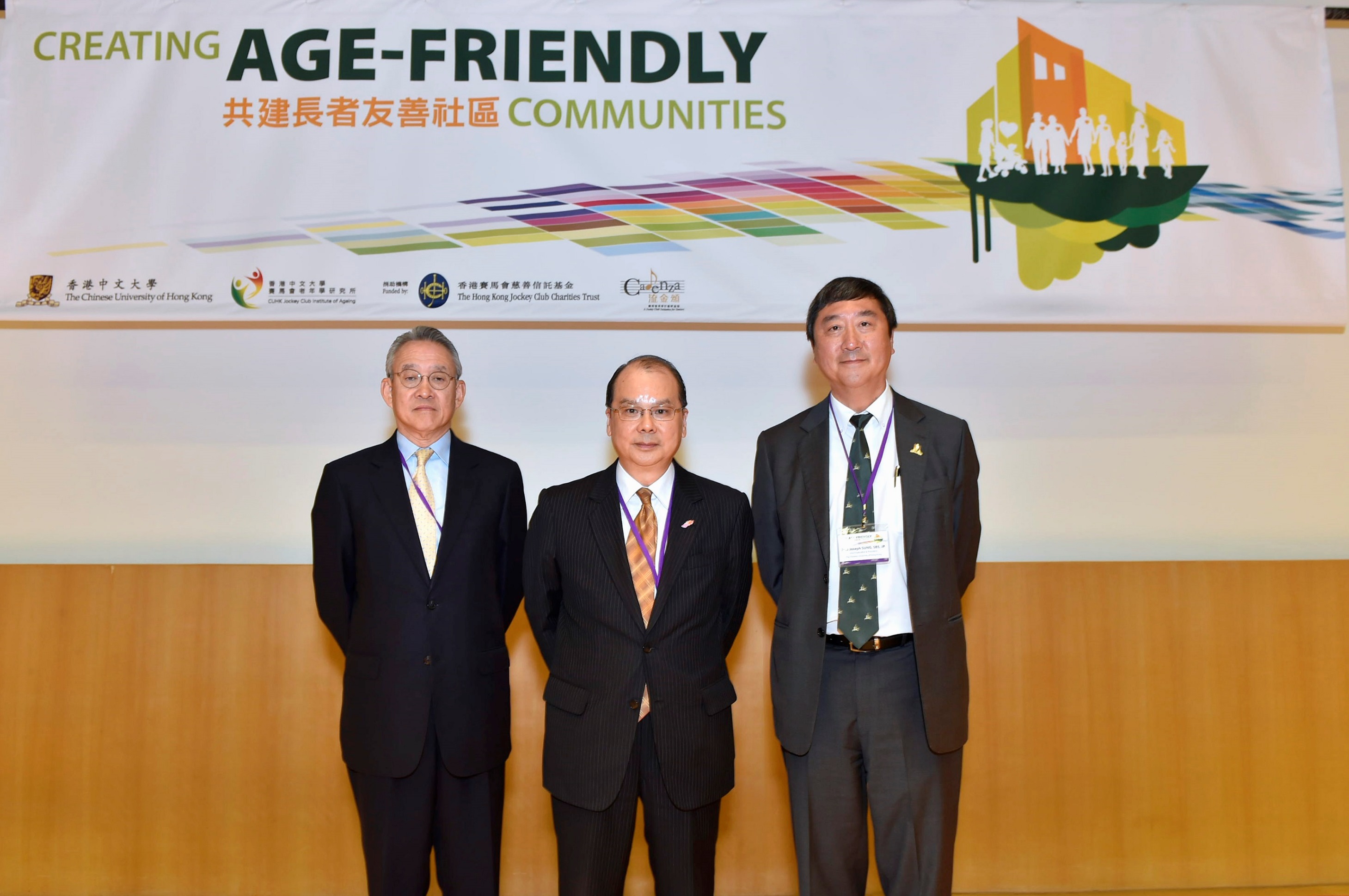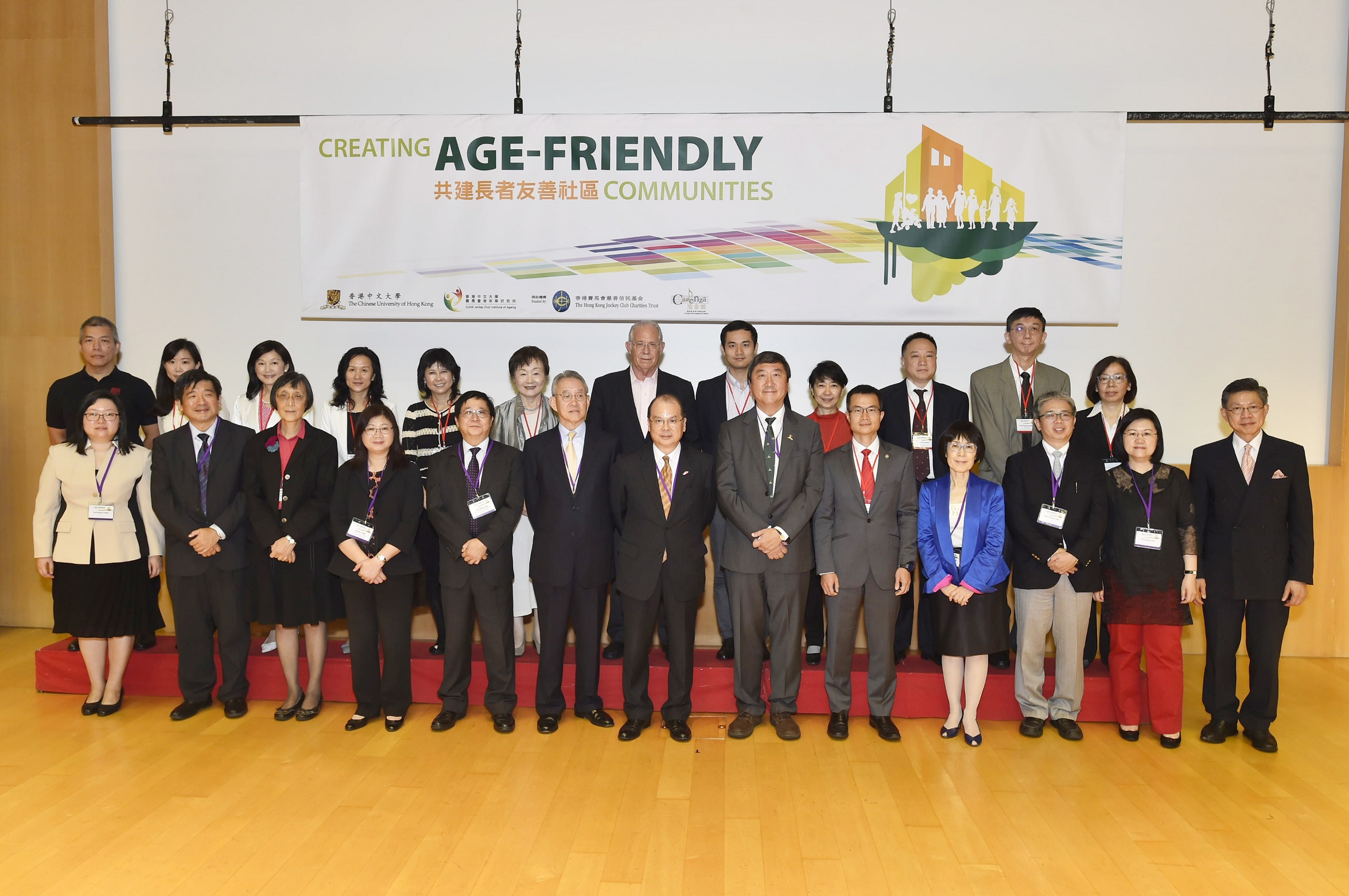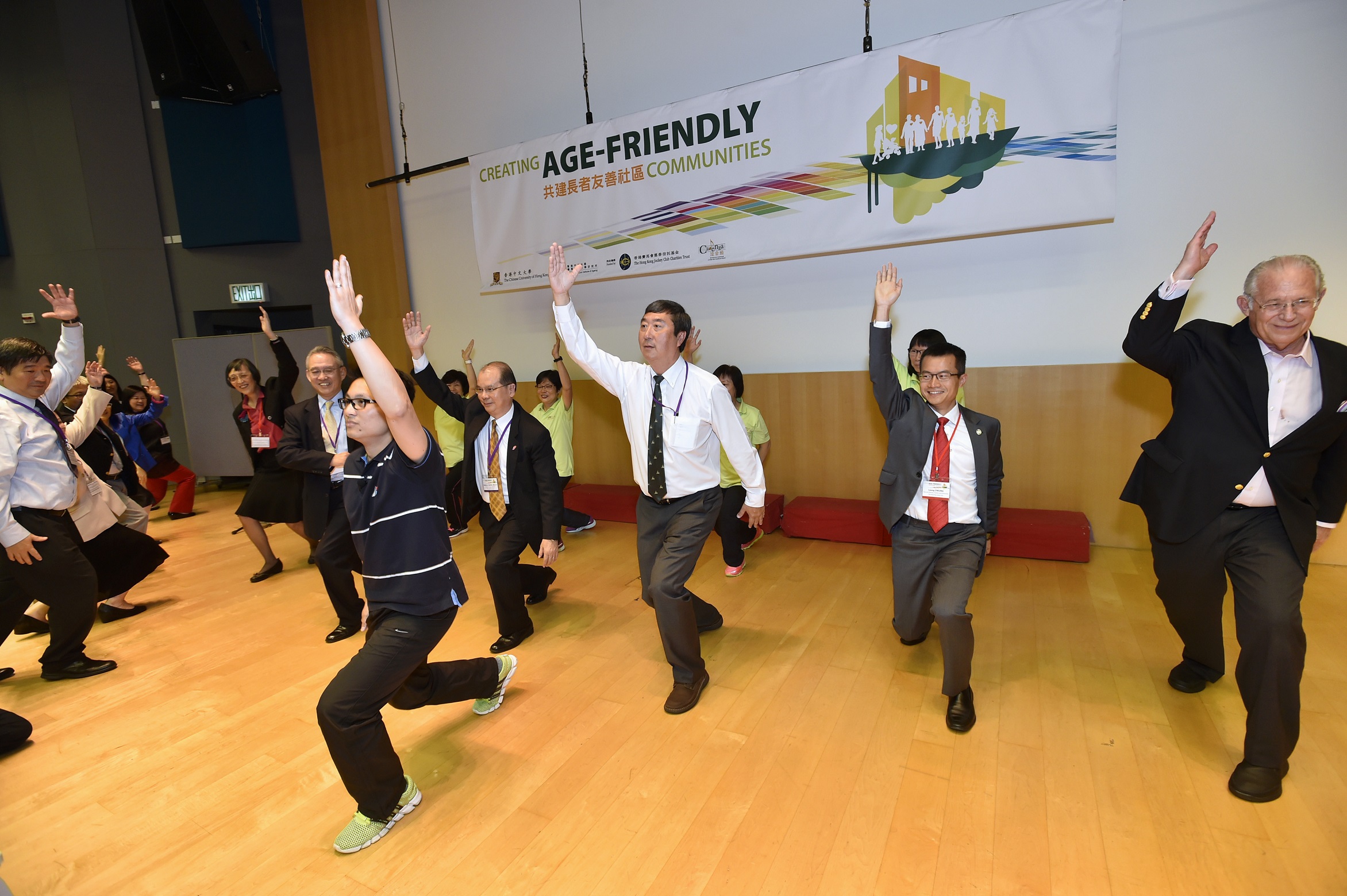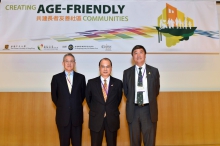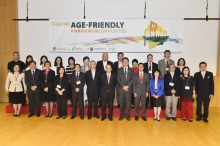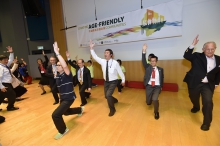CUHK
News Centre
CUHK Jockey Club Institute of Ageing Launch Conference Held Today on ‘Creating Age-Friendly Communities’
Established last year with a donation of HK$12 million from The Hong Kong Jockey Club Charities Trust, the Jockey Club Institute of Ageing (IOA) at The Chinese University of Hong Kong (CUHK) held its Launch Conference today (8 Oct) on ‘Creating Age-Friendly Communities’ to enable experience sharing and discussion on various aspects of the theme. The conference was well attended by over 300 renowned academics in gerontology from the U.S., Singapore, Japan, mainland China and Hong Kong, as well as representatives from organizations working on improving seniors well-being and welfare.
The opening ceremony of the Launch Conference was officiated by Mr Matthew CHEUNG, Secretary for Labour and Welfare, HKSAR Government; Mr Anthony CHOW, Deputy Chairman of The Hong Kong Jockey Club (HKJC); and Prof. Joseph SUNG, Vice-Chancellor and President of CUHK. They led the audience to conduct some exercises to highlight the significance of frailty prevention and regular exercise.
Ageing population has posed challenges to different countries and prompted the World Health Organization to advocate the creation of age-friendly cities around the world. In his welcoming remarks, Prof. Joseph SUNG, Vice-Chancellor and President of CUHK, remarked, ‘The conference provides a good chance for us to learn from other cities’ experience in creating age-friendly communities. As a research institute, IOA aims to facilitate cross-disciplinary research programmes involving various fields including medicine, public health, architecture, sports science, social work, and engineering. To further strengthen the institute’s research work, the University will allocate a grant of $12 million to IOA to embark on projects with larger and wider research collaboration and greater impact to the community.’
Mr Chow noted that The Hong Kong Jockey Club had already been proactive in addressing the challenges of the ageing population by launching the CADENZA project with academic institutions, Government departments and non-governmental organisations as early as 2006 to explore and pioneer new approaches to elderly care. More recently, it funded the establishment of CUHK Jockey Club Institute of Ageing last year. “It is our belief that the elderly sector needs to shift towards a more preventive approach – in particular by promoting active, healthy, and more socially-inclusive ageing, which extends the healthy years of the elderly and delays the onset of disabilities and their need for care, thereby improving their quality of life,” he explained. “Later this year, the Trust will collaborate with various partners to implement several initiatives to help build Hong Kong as an age-friendly city, so as to cater for the various needs of our older generation.”
Addressing at the Conference, the Secretary for Labour and Welfare, Mr Matthew Cheung Kin-chung, noted that the ageing population, declining birth rate and longer life expectancy pose a huge challenge for Hong Kong. The current-term government has, therefore, put elderly care at the top of the policy agenda and is committed to improving the livelihood of the senior citizens and inculcating an elderly-friendly culture.
“We need to make strategic decisions and prepare for a fast ageing population and, more importantly, to build age-friendly communities such that our senior citizens can enjoy their golden years in a positive, meaningful and dignified manner,” Mr Cheung said. He pointed out that the estimated recurrent expenditure on elderly care services in 2015-16 amounts to about $6.8 billion, representing 11.5 per cent of the total recurrent social welfare expenditure. Taking into consideration Government spending on social security and health care, recurrent expenditure for the elderly as a whole adds up to a substantial $62 billion or a significant 19.1 per cent of the total government recurrent expenditure.
The topics covered in the Launch Conference included: Redesigning Communities for Aged Society, Frailty and Geriatric Syndromes, and Age-friendly Hospital and Service. Overseas speakers included Prof. Hiroko Akiyama, Institute of Gerontology, The University of Tokyo, Japan; Prof. Piu Chan, Beijing Institute of Geriatrics, Beijing, China; and Dr William Haseltine, Chairman and President, Access Health International.
Representatives from CUHK and Hospital Authority also shared their studies on and experience in implementing age-friendly hospitals and services. Though frailty has become increasingly prevalent with the ageing population, research findings on frailty in the community and its related factors suggested that the proper physical exercises and training can slow down the decline in bodily functions and improve mental health and living conditions. In addition, as the number of elderly patients in hospitals is increasing, hospital facilities such as dementia wards can be adapted to alleviate patients’ behavioral and emotional disturbance.
In addition, representatives of the ageing centres/institutes of four local universities who have participated in the territory-wide age-friendly city programme initiated by the HKJC Charities Trust, including The CUHK Jockey Club Institute of Ageing, Institute of Active Ageing at The Hong Kong Polytechnic University, Asia-Pacific Institute of Ageing Studies at the Lingnan University, and Sau Po Centre on Ageing at The University of Hong Kong, also gathered at the conference for the first time to share the progress of the programme, including the initial assessment and observations on the levels of age-friendliness of eight districts including Kowloon City, Shatin and Wan Chai, as well as the establishment of social networks in these districts.
Prof. Jean Woo, Director of CUHK Jockey Club Institute of Ageing and Chairman of Department of Medicine and Therapeutics at CUHK, supplemented, ‘To gauge public perception of the levels of age-friendliness in Tai Po and Sha Tin districts, we have been in close contact with various local bodies and trained over 30 students and “age-friendly” ambassadors since July, so as to collect relevant data and facilitate smooth implementation of our progamme and promote age-friendly messages among districts.’
The opening ceremony of the launch conference was officiated by Mr Matthew CHEUNG (middle), Secretary for Labour and Welfare, HKSAR Government; Mr Anthony CHOW (left), Deputy Chairman of The Hong Kong Jockey Club; and Prof. Joseph SUNG, Vice-Chancellor and President of CUHK.


